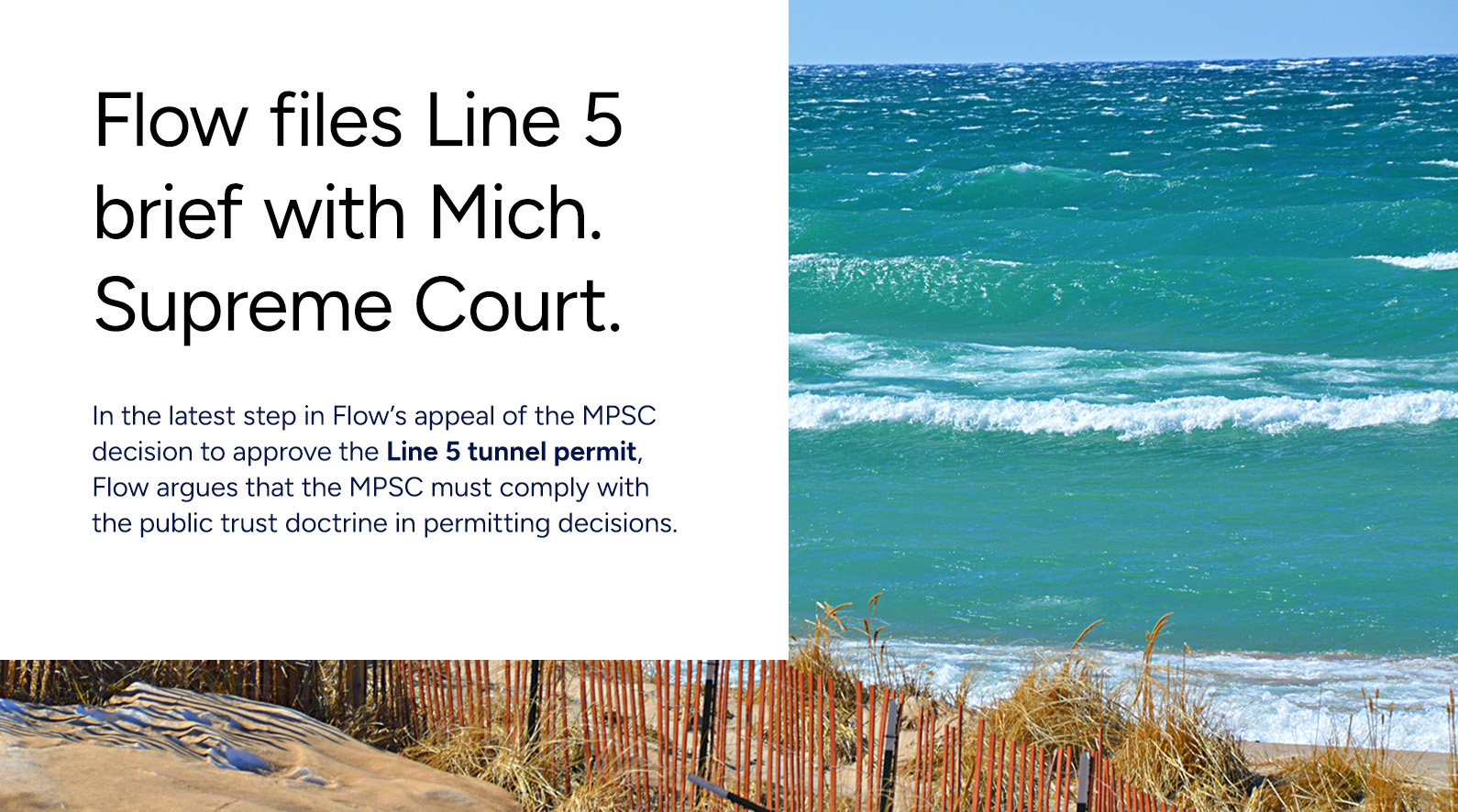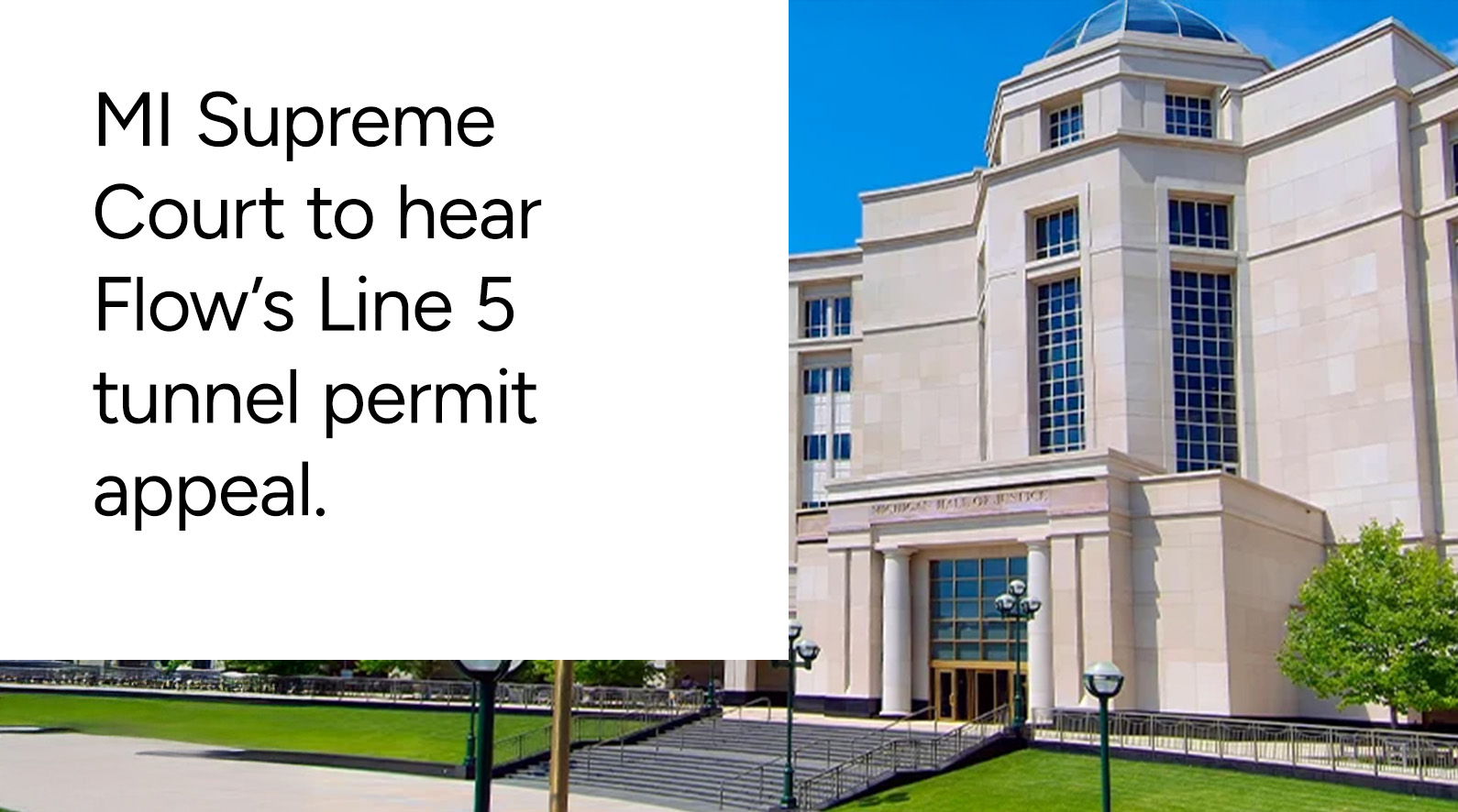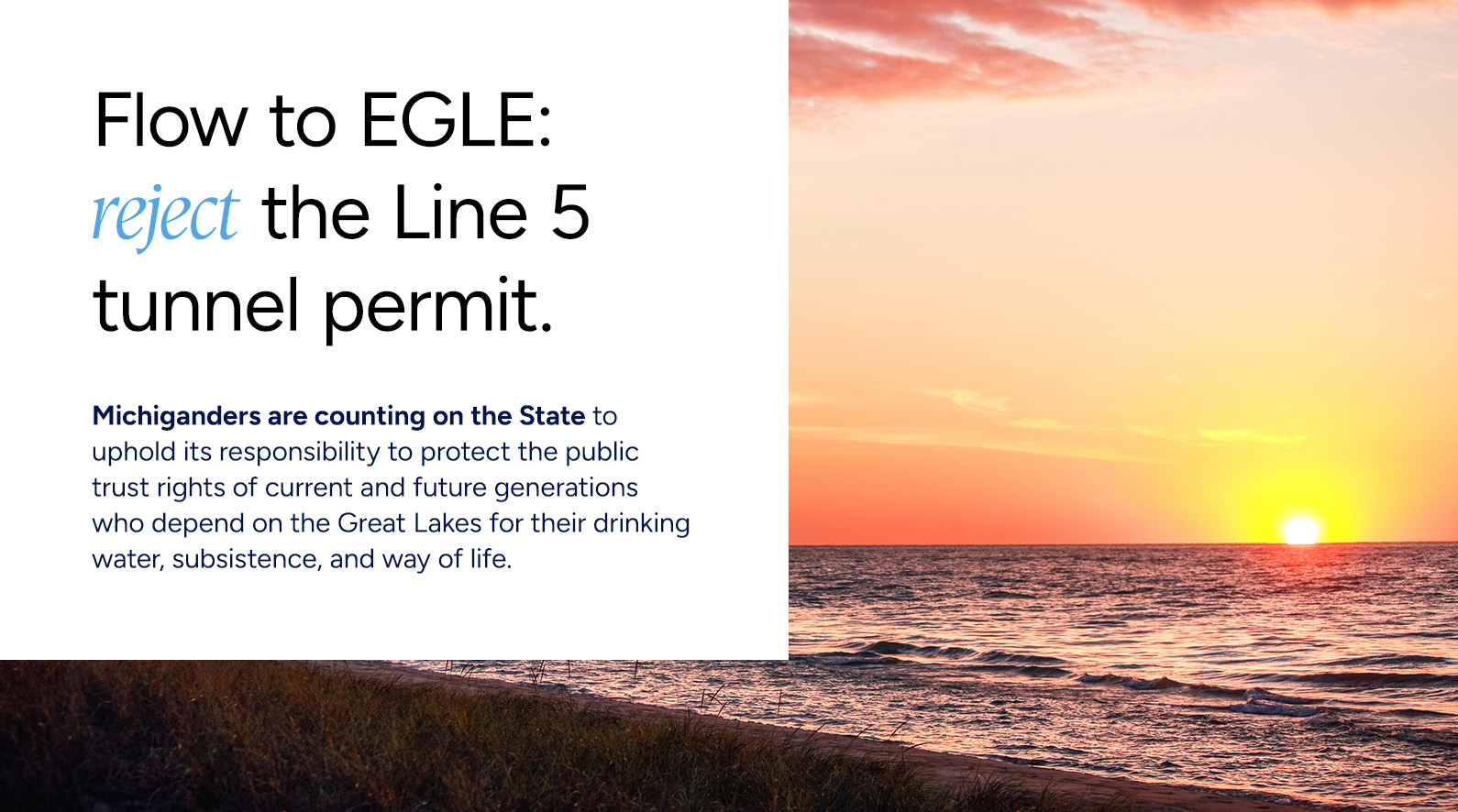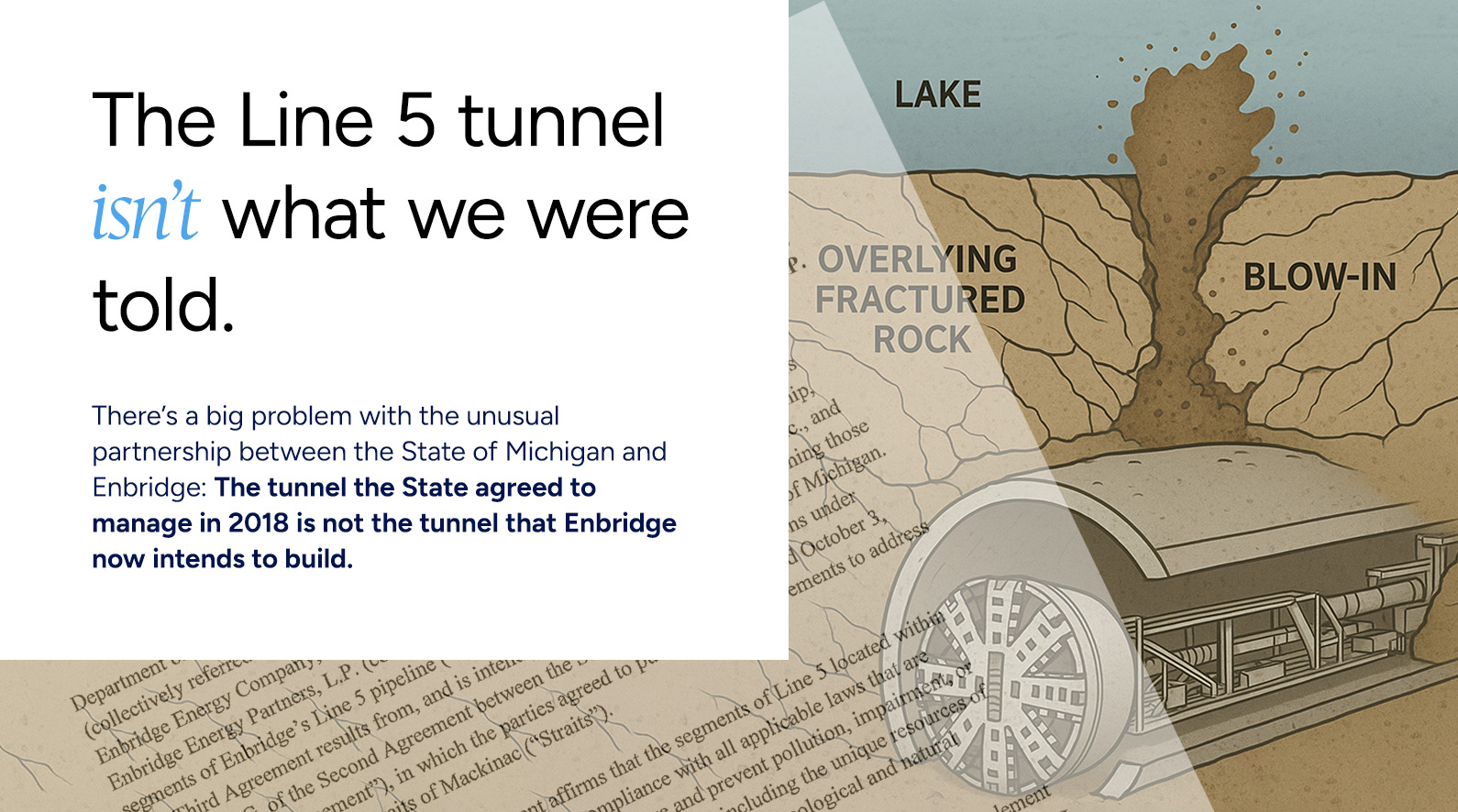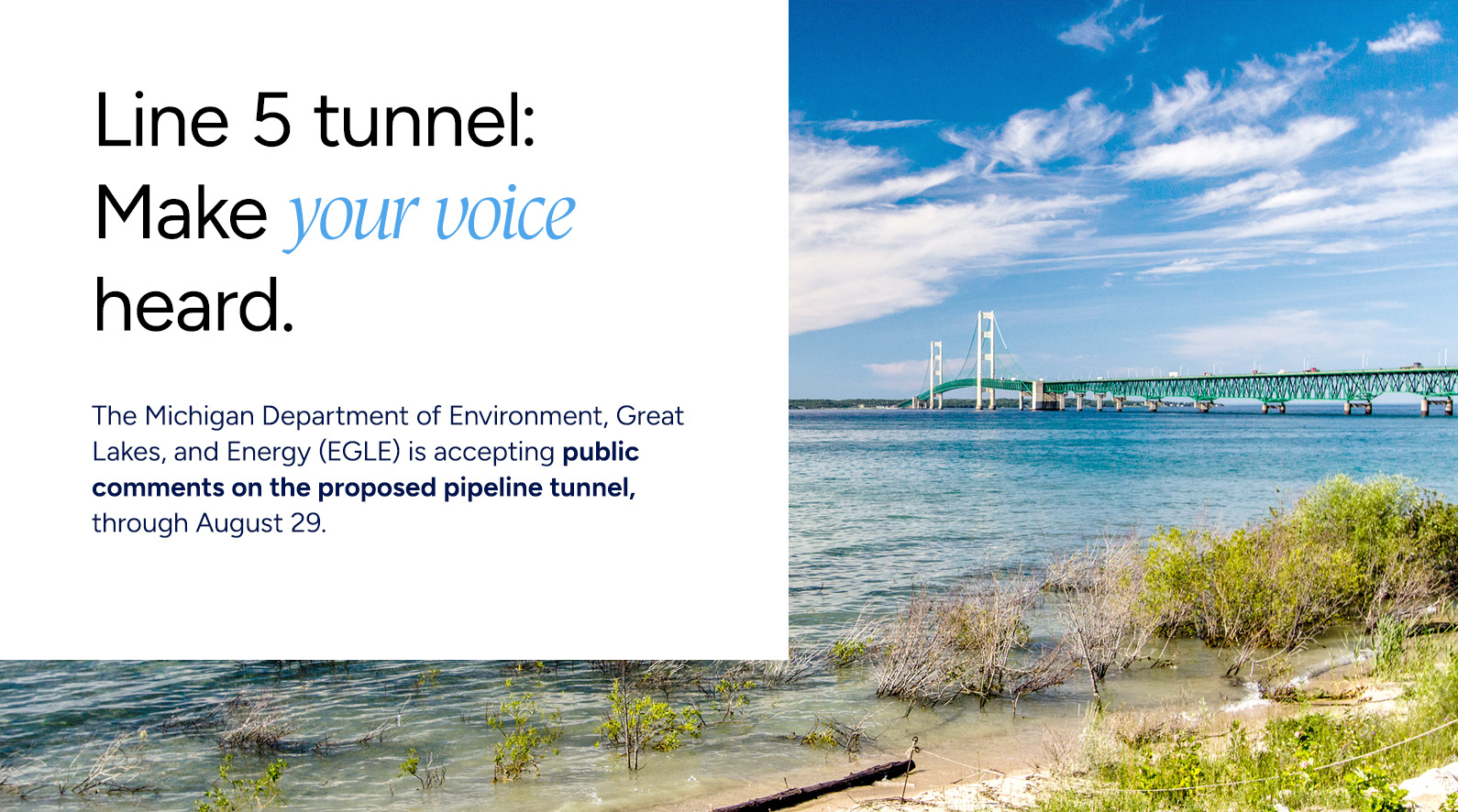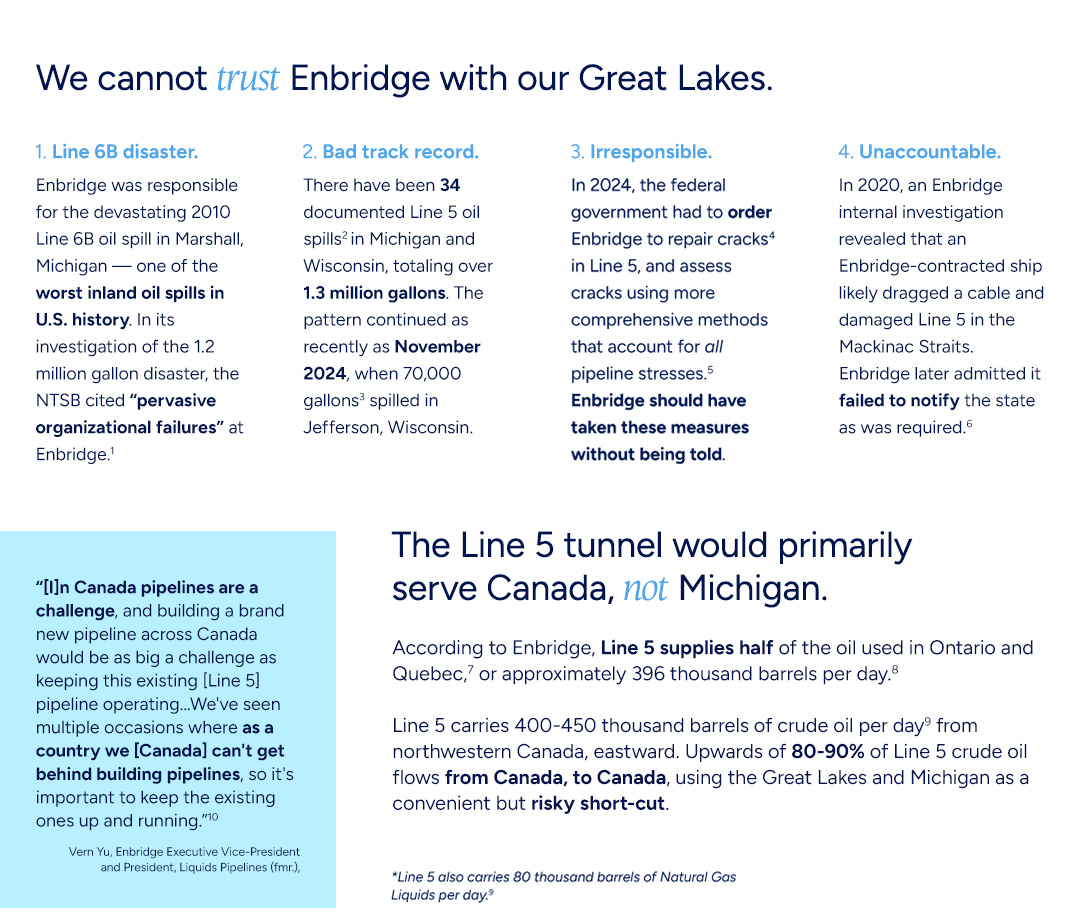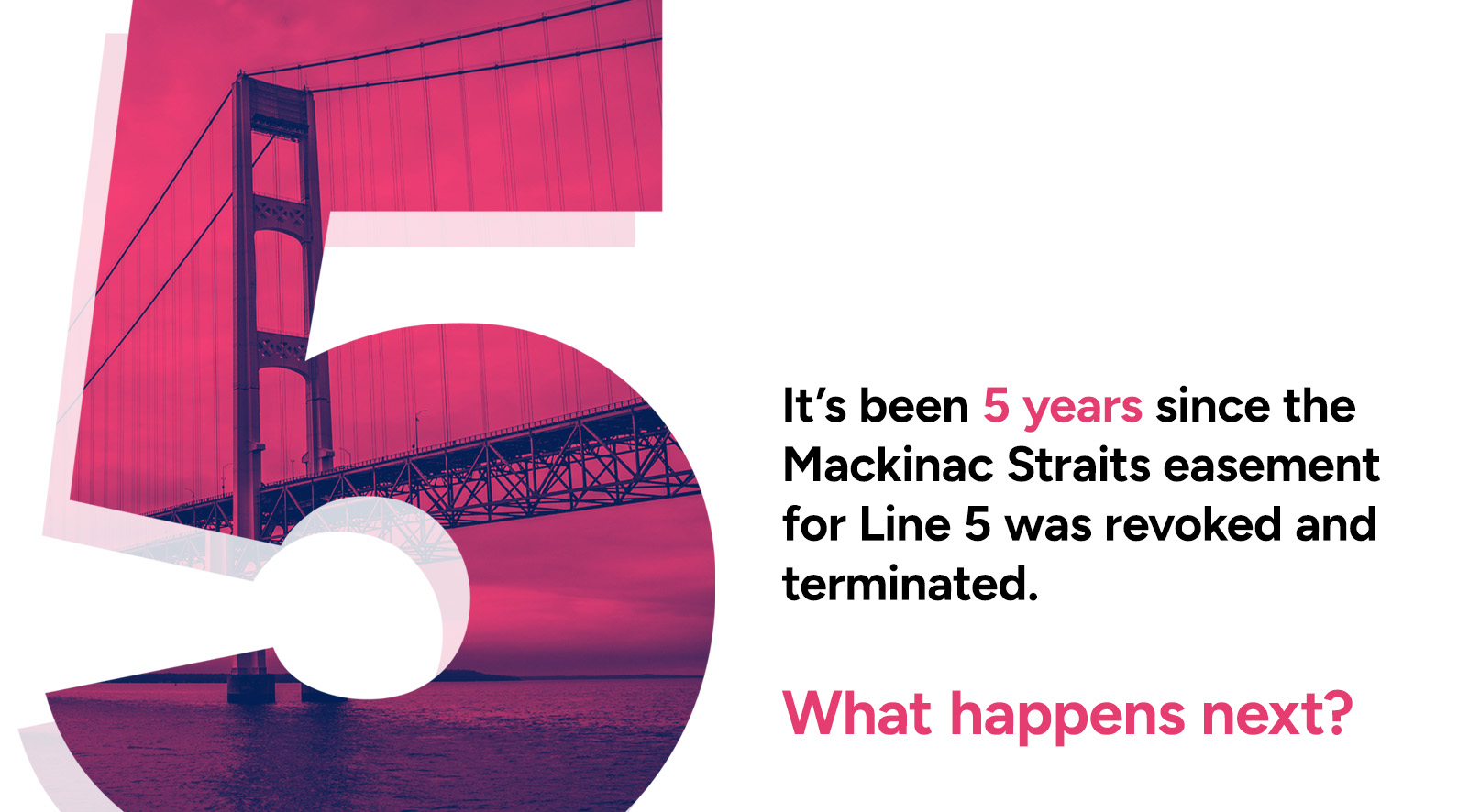
Five years ago, on November 13, 2020, Michigan Governor Gretchen Whitmer and the Department of Natural Resources revoked and terminated the 1953 easement that had allowed Enbridge to locate and operate its dual Line 5 pipelines on the lakebed and in the waters of the Straits of Mackinac. As public trustee and fiducidary, the state revoked the easement for two key reasons:
- The state has a duty under the public trust doctrine to protect the waters of the Great Lakes for the people of Michigan. This duty required the state to revoke the easement due to the “extraordinary and unacceptable risk” posed by the aging, vulnerable pipelines, which have been struck multiple times by anchors and cabling.
- Enbridge “repeatedly and incurably” violated the express terms of this public trust easement, and had done so for decades. Enbridge persistently failed to satisfy numerous conditions related to the support, protective coatings, and curvature of the pipelines.
An analogy to landlord-tenant law is warranted since the state of Michigan is the sovereign owner and protector of the public trust waters and bottomlands in the Great Lakes. In the case of landlord-tenant relations, any landlord would be within their rights to evict a tenant who violated their lease, repeatedly left the stove on and the bathtub overflowing, and refused to leave when the lease was up. And a landlord would be correctly concerned about a tenant who had previously burned down another apartment due to negligence.
Half a decade later.
And yet, half a decade later, the Line 5 pipelines remain, haphazardly suspended across the lakebed floor, buffeted by strong currents and vulnerable to anchor strikes and other hazards in one of the busiest shipping lanes in the Great Lakes. Each day, Line 5 carries nearly 23 million gallons of fossil fuels from western Canada, through the Great Lakes — the majority of which supply Canadian refineries in Ontario and Quebec. The water security of the Great Lakes is at high risk every day.
On each of the 1,825 days and counting since the easement was revoked, Michigan has borne unacceptable risks so that a Canadian pipeline company can continue to profit, protect its market share, and deliver crude oil primarily from Canada to Canada. The Line 5 pipeline in the Straits of Mackinac could only be built in 1953 with a public trust easement from the state of Michigan; therefore, an easement authorizing Enbridge permission to occupy our public waters is necessary for its continued operation. That easement no longer exists.
The Line 5 pipeline and the proposed replacement tunnel are now being fought in multiple courts by multiple parties, including Flow Water Advocates.
Here’s where Line 5 currently stands in Michigan:
Nessel v. Enbridge
At issue:
In 2019, Michigan Attorney General Dana Nessel filed suit in Michigan’s 30th Circuit Court (Ingham County), seeking an order to decommission Line 5. She argues that its continued operation violates the public trust doctrine, is a public nuisance under common law, and violates the Michigan Environmental Protection Act.
Flow, along with the Great Lakes Business Network and the Sierra Club, briefed the court in 2019, 2021, and 2024 in support of Michigan’s sovereignty and public trust rights.
What has happened so far:
Enbridge has successfully delayed the case (and kept the oil and profits flowing) over matters of jurisdiction, and it initially succeeded in moving the case from state to federal court — long after the 30-day time limit to do so had passed.
- In June 2024, the U.S. Sixth Circuit Court of Appeals ruled that the move to federal court was indeed untimely, and sent the case back to state court.
- Enbridge then appealed to the U.S. Supreme Court, which in June 2025 agreed to hear the case on the procedural question of whether district courts have the authority to excuse the 30-day time limit — again prolonging the risks of Line 5’s continued operation. The SCOTUS will hear oral arguments in spring 2026.
In August 2025, Ingham County circuit court Judge James Jamo denied Enbridge’s request to stay (pause) the state case while awaiting a SCOTUS ruling. We are now awaiting a decision by Judge Jamo on whether Line 5 will be shut down.
Enbridge v. Whitmer
At issue:
On November 24, 2020, Enbridge filed its federal court lawsuit asserting that Governor Whitmer does not have the authority to protect its sovereign interests of public trust waters and submerged lands, and that state action against Line 5 may violate Enbridge’s alleged treaty right to pump oil through the Great Lakes uninterrupted.
What has happened so far:
Governor Whitmer moved to dismiss the action on the grounds that state officials have immunity from federal lawsuits under the U.S. Constitution’s Eleventh Amendment. Enbridge’s separate federal case against the state still remains before Judge Jonker in the U.S. District Court for the Western District of Michigan who held (we think wrongfully) that an exception applies.
- In an October 2024 amicus brief, Flow and the Great Lakes Business Network argue that Enbridge’s lawsuit impairs state sovereign and public trust duties; and that long-standing legal principles that balance federal and state sovereign interests weigh in favor of states’ rights and jurisdiction over the public navigable waters and bottomlands of the Great Lakes.
On November 12, 2025, Judge Jonker heard oral arguments in the case. Michigan Assistant AG Keith Underkoffler argued that the state’s preexisting authority could not be undermined by the federal Pipeline Safety Act, which wasn’t enacted until 1968. Further, he argued that the state would not have granted the easement in 1953 if it had known that 15 years later, the state’s rights in relation to the easement would be preempted by the federal government.
Judge Jonker is now considering the arguments, and we are awaiting a decision.
Michigan Supreme Court: Line 5 tunnel permit
At issue:
In late 2023, the Michigan Public Service Commission approved a permit for Enbridge’s proposed Line 5 pipeline tunnel under the Straits of Mackinac. In doing so, Flow argues that the MPSC failed in its duties under the public trust doctrine, Michigan Environmental Protection Act (MEPA), and Great Lakes Submerged Lands Act to protect the waters of the Great Lakes and their bottomlands for the people of Michigan; and that the MPSC failed to consider feasible and prudent alternatives to the tunnel.
What has happened so far:
Flow, along with other environmental groups, tribes, and an individual, appealed the MPSC’s permit decision in the Michigan Court of Appeals. In February 2025, the Court of Appeals affirmed the MPSC’s tunnel permit.
Flow and others then appealed that decision to the Michigan Supreme Court, which in September 2025 announced it would hear the appeals, paving the way for a review of the permit. The Supreme Court specifically directed the parties to address whether the MPSC is required to comply with the common law public trust doctrine and MEPA in its permitting decisions.
What happens next:
Flow and the other appellants submitted opening briefs to the court on November 14, 2025. Additional briefing will take place in December and January, with oral arguments expected to be scheduled in 2026.
Meanwhile, the proposed tunnel has yet to receive the required permits from the Michigan Department of Environment, Great Lakes, and Energy (EGLE) and the U.S. Army Corps of Engineers (USACE).
Read: Flow’s comments to EGLE; Flow’s comments to USACE.
The USACE is now also conducting a supplemental Environmental Impact Statement (EIS) that will evaluate horizontal directional drilling. Public comments are due December 5, 2025.
The next five years.
It is unlikely — though not impossible — that we will go another half-decade before the Line 5 threat is resolved. Flow is fighting every day for a resolution that respects Michigan’s sovereignty, the public trust doctrine, and the rights of all Michiganders present and future to enjoy, navigate, use, and be sustained by the irreplaceable waters of our Great Lakes. As part of our work, we also are committed to ensuring water security and energy security solutions for the Great Lakes region. It is our fervent hope that Line 5 is shut down lawfully by our civil courts, and not because of an oil spill disaster.
